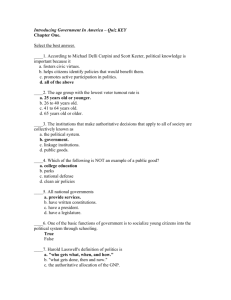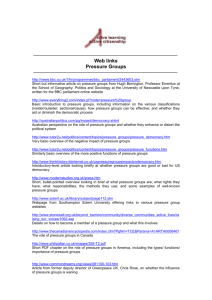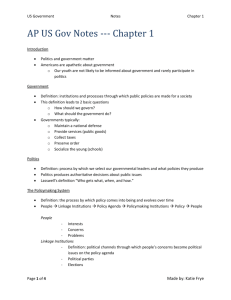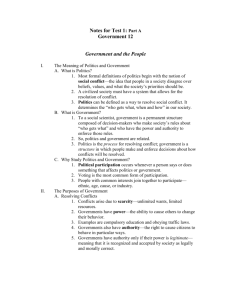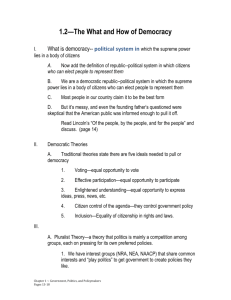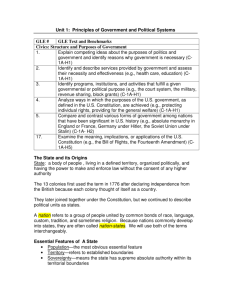Chapter 1
advertisement
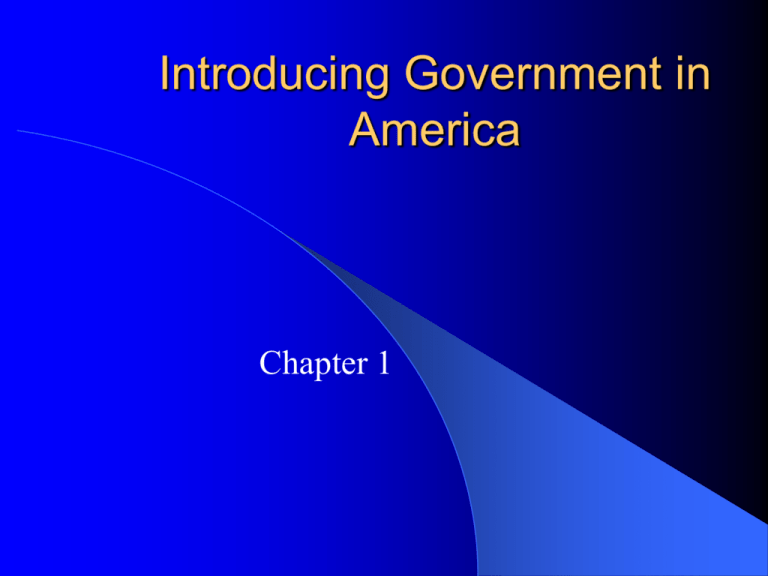
Introducing Government in America Chapter 1 Introduction Politics and government matter. Americans are apathetic about politics and government. American youth are less likely to be informed about government and politics and participate less in politics. Introduction The Political Disengagement of College Students Today (Figure 1.1) Introduction Introduction Presidential Election Turnout Rates by Age (Figure 1.2) Government Definition: – The institutions and processes through which public policies are made for society. This definition leads to two basic questions: – How should we govern? – What should government do? Politics Definition: – The process by which we select our governmental leaders and what policies these leaders produce. Politics produces authoritative decisions about public issues. Also consider Lasswell’s definition: – Who gets what, when and how. The Policymaking System Figure 1.3 The process by which policy comes into being and evolves over time. People Interests Problems Concerns Linkage Institutions Political Parties Elections News & Entertainment Media Interest Groups Policy Agenda Political Issues – These arise when people disagree about a problem and how to fix it. Items at the top of the policy agenda are taken care of first. It may take years to get an item on the policy agenda, and then several more years to get it acted on. Policymaking Institutions Legislature (Congress) Executive (President) Courts (Federal and State) Bureaucracies (Federal and State) Policy Impacts People Policy Impacts People Impacts of policies: Does it solve the problem? Does it create more problems? Democracy Definition: – A system of selecting policymakers and of organizing government so that policy represents and responds to the public’s preferences. Equality in voting Effective participation Enlightened understanding Citizen control of the agenda Inclusion Theories of U.S. Democracy… Pluralist Theory – A theory of government and policies emphasizing that politics is mainly a competition among groups, each one pressing for its own preferred policies. Groups will work together Public interest will prevail Theories of U.S. Democracy… Elite and Class Theory – A theory of government and politics contending that societies are divided along class lines and that an upper-class elite will rule, regardless of the formal niceties of governmental organization. Not all groups are equal Policies benefit those with money / power Theories of U.S. Democracy… Hyperpluralism – A theory of government and politics contending that groups are so strong that government is weakened. Exaggerated / perverted form of pluralism Confusing / contradictory policies Gridlock- inability to act at all Challenges to Democracy Increased Technical Expertise Limited Participation in Government Escalating Campaign Costs Diverse Political Interests Questions About Democracy Are the people knowledgeable- and do they apply what they know? Do interest groups help the process, or do they get in the way? Do political parties offer clear consistent choices for voters? Does the President & Congress work in the best interests of ALL the people? American Individualism Individualism is the belief that individuals should be left on their own by the government. Individualism is highly valued in the United States with a strong preference for free markets and limited government. Questions about the Scope of Government How big a role does the Constitution say should be played by the federal government? Does a bigger, more involved (active) government limit the people’s freedoms? Do we need a bigger, more involved government to protect our freedoms? Questions about the Scope of Government, continued… Do competing political parties make for better policies? Do more interest groups create a bigger government? Does the media help control the size and policies government? Questions about the Scope of Government, continued… Can the president control the government, or has it gotten too big? Can Congress respond to the needs of the people, or just to the interest groups? Do members of Congress expand government by seeking to be re-elected? Questions about the Scope of Government, continued… Do the federal courts overstep their bounds and intrude on the powers of other branches of government? Are the federal agencies too large and unresponsive to the public they are supposed to serve?


